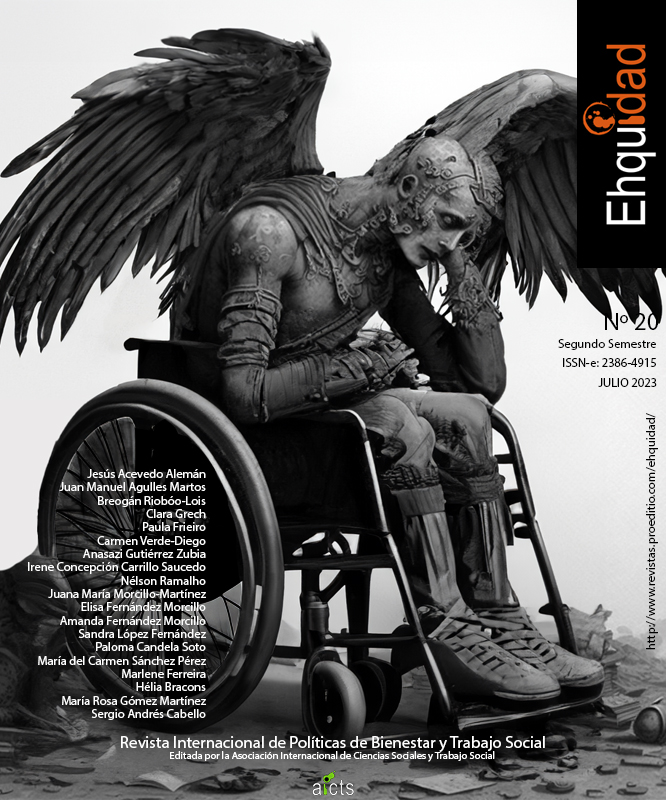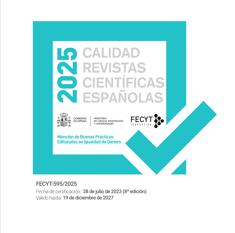The 2nd Reconceptualization of Social Work in Latin America.
Reality, fiction or the dream of the Faun?
DOI:
https://doi.org/10.15257/ehquidad.2023.0011Keywords:
Reconceptualization, Social Work, Disciplinary Identity, Social Intervention, The New PracticeAbstract
60 years after one of the largest intellectual movements in Latin America, which energized the construction of new identities, and particularly that of Social Work; It was where it emerged as a scientific discipline of solid theoretical-methodological contributions, which gave a full response to the prevailing historical contexts. Today, the profession faces different contexts, global implications, complex realities and unprecedented technological developments. In addition to this, a Covid-19 pandemic that has wreaked havoc at all levels in its wake. Scenario that favors the need to generate new models of attention, with greater theoretical-methodological strengths, which allow to meet the new challenges. In this sense, the purpose of this article is to situate the reflection on the premises that can distinguish a 2nd Reconceptualization Movement, which although we are already living it, but we still do not recognize it, therefore, the important thing is to make visible the efforts and reflections that have been detonated in the light of the new millennium; remember that the validity and strength of one's own disciplinary profile will depend on the ability to adapt and evolve to the same extent as social phenomena and new contemporary realities
Downloads
References
Acevedo Alemán, J. (2016). Re-pensar el trabajo social 3.0. Voces de los Millenials. La generación Geek. Editorial: UADEC/CGEPI
Acevedo, J., Gallegos, B., y De León, G.E. (2019). De la intervención a la sanación social. La evolución del Trabajo Social: una mirada irracional. Trabajo Social Hoy, 88, 69-84 doi: 10.12960/TSH.2019.0016
Acevedo Alemán, J. (2022). De las realidades virtuales complejas al transhumanismo. Retos en las Ciencias Sociales. Uperpectiva. Revista sobre Educación y Ciencia. Universidad Pedagógica de El Salvador “Dr. Luis Alonso Aparicio”. ISSN 2309-7817
Alayón, N. (1987). Definiendo al trabajo social. Buenos Aires, Argentina: Hvmanitas
Alayón, N., Aquín, N., Castro, N., De Paula Faleiros, V., et al. (2005). Trabajo Social Latinoamericano. A 40 años de la Reconceptualización. Buenos Aires: Espacio Editorial, 2005, 300 pp.
Alayón, N. y Molina M., L. (2004). Acerca del movimiento de Reconceptualización. Revista Prospectiva. Universidad Del Valle. 2004. Nº 9
Alayón, N. y Molina, M. L. (2007). La desigualdad social: desarrollo y desafíos del Trabajo Social desde la Reconceptualización en América Latina. Revista Textos & Contextos Porto Alegre v. 6 n. 1 p. 34-68. jan./jun. 2007
Bravo Castillo, E. (2018). El contexto latinoamericano y los desafíos políticos y éticos del Trabajo Social. NUEVA ACCION CRITICA.
Diálogos desde el trabajo social Latinoamérica. Revista Institucional del Celats. Año 1. N° 1 - Octubre 2018 (revista trimestral)
CELATS (2020). Trabajo Social: Formación profesional y Desafíos para el ejercicio profesional al 2030. https://celats.org/noticias/trabajo-social-formacion-profesional-y-desafios-para-el-ejercicio-profesional-al-2030/
Faleiros, V. (1987). Confrontaciones teóricas de la Reconceptualización. Revista Acción Crítica n° 21. Lima. CELATS.
García Lirios, C., Carreón Guillén, J., Hernández Valdés, J., Arturo Limón, G., Lourdes Morales, M., y Bustos, J. (2015). Dimensiones conceptuales de sustentabilidad para la construcción de una agenda pública y la reconceptualización del trabajo social. Revista Trabajo Social, (14), 117–131. Recuperado a partir de https://revistas.udea.edu.co/index.php/revistraso/article/view/24234
Ibáñez, T. (1998). Representaciones sociales. Teoría y método. En Psicología Social construccionista, Universidad de Guadalajara, México. Barcelona, Sendai, 1988.
Ibáñez, T. (1992). ¿Cómo se puede no ser construccionista hoy en día?. En Revista de Psicoterapia, n.° 12, págs. 22-23, Barcelona, 1992.
INFOBAE (2020). COVID-19, un antes y un después en el mundo del trabajo. https://www.infobae.com/tendencias/talento-y-liderazgo/2021/09/21/covid-19-un-antes-y-un-despues-en-el-mundo-del-trabajo/
Kisnerman, N. (1998). Pensar el trabajo social, una introducción desde el construccionismo. Ediciones EDWARD
Leff, E. (2002). Saber ambiental. México, Siglo XXI Editores.
Leff, E. (2004). Racionalidad ambiental. La reapropiación social de la naturaleza, México, Siglo XXI Editores
Leff, E. (2008). Discursos Sustentables. México, Siglo XXI Editores
Morín, E. (1990). Introducción al pensamiento complejo. España: Gedisa
Netto, J. P. (1981). La crítica conservadora a la Reconceptualización. Revista Acción Crítica n° 9. Lima. CELATS.
Quintero Londoño, S. A. (2014). El “método caldas” y la reconceptualización del trabajo social. Revista Eleuthera, vol. 10, enero-junio, 2014, pp. 182-203. Universidad de Caldas
Segal, L. (1994). Soñar la realidad El constructivismo de Heinz von Foerster. Barcelona, Paidós, 1994, pág. 25
Torralba, F. (2019). El transhumanisme sota la lupa. Conferencies curs 2017-2018. Obra Social “la Caixa”
Vivero-Arriagada, L. (2017). Aportes del pensamiento latinoamericano al trabajo social crítico. SOPHIA AUSTRAL Nº 20, 2do Semestre 2017: 71-8
Vivero-Arriagada, L. (2020). Condiciones para una Neo-Reconceptualización del Trabajo Social en Chile, Latinoamérica y el Caribe. Prospectiva. Revista de Trabajo Social e intervención social, (29), 193-212. doi: 10.25100/prts.v0i29.8241












